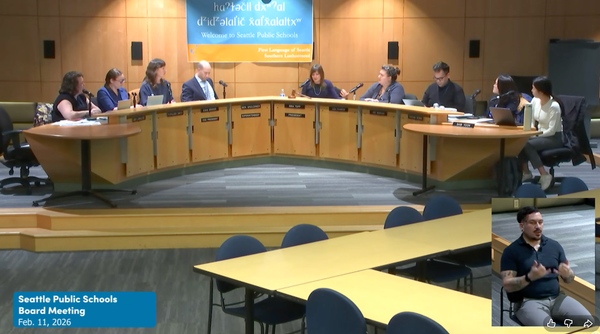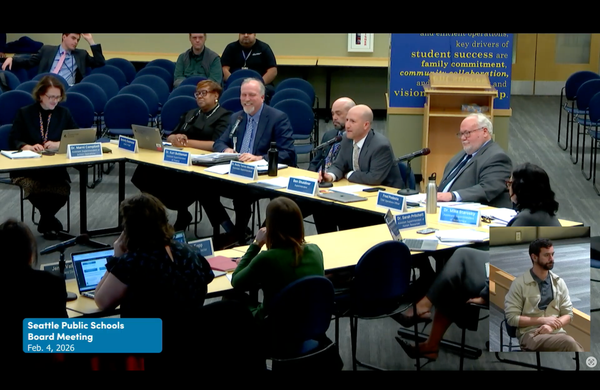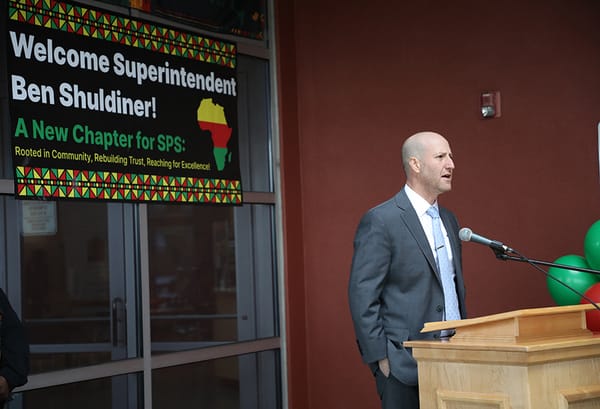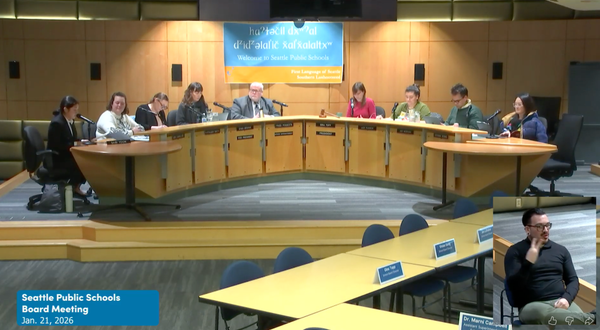Issue 2 -- Habemus Directores!
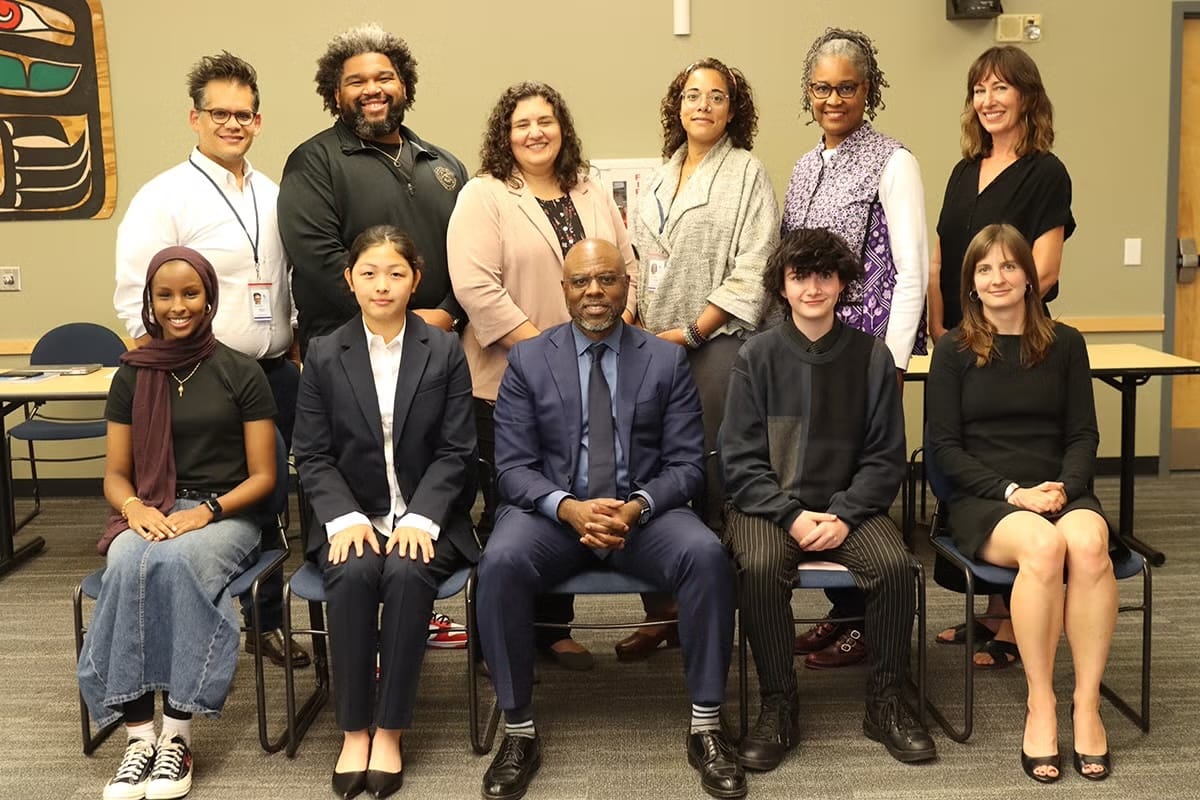
In this issue:
- School Board Elections: A New Hope
- The Stranger-Appointed School Board
- The Stranger Waged War on Sarah Clark
- What We Are Reading
All articles in this issue are by Robert Cruickshank. If you have an article you’d like to write for The Bulletin, email us at tips@thebulletinsea.org.
This issue is unusually long. Future issues will only have one or two shorter articles in them. There's just a lot to say about the Stranger and the school board!
School Board Elections: A New Hope
With pretty much all the ballots counted, the end result of this year’s school board elections is clear: the Stranger won. But the outcome may bring some new hope to the board, even as it comes with a kick-in-the-teeth defeat.
All four candidates endorsed by the Stranger – Kathleen Smith, Joe Mizrahi, Vivian Song, and Jen LaVallee – won their races, most by large margins. (Note: I endorsed and helped on the campaigns of Sarah Clark, Joe Mizrahi, Vivian Song, and Jen LaVallee.)
The vote totals as of Friday are:
District 2
Kathleen Smith: 53.09%
Sarah Clark: 46.37%
District 4
Joe Mizrahi: 78.22%
Laura Marie Rivera: 21.34%
District 5
Vivian Song: 78.90%
Janis White: 20.57%
District 7
Jen LaVallee: 59.25%
Carol Rava: 40.20%
What do these results mean for the school board itself? It means there’s some new hope for positive and constructive change, and potentially leadership willing to change course in a better direction. There's a clear mandate to end the use of the flawed Student Outcomes Focused Governance model (SOFG) and to reject future school closures.
But it also comes with the defeat of Sarah Clark, a heavy blow to progressives and reformers. We have a lot more to say about that below.
Liza Rankin lost an ally when Michelle Sarju retired, but will gain an ally in Kathleen Smith. Smith’s website and answers on questionnaires closely resemble Rankin’s own comments, and Smith has said she looks forward to working with Rankin. As Smith is brand new to SPS and has very little understanding of SPS issues, expect her to start off as a rubber stamp vote for whatever Rankin wants.
It’s possible Smith wises up once she’s actually on the board and sees the grim reality of Rankin’s agenda and how deeply unpopular it is with families, but she’s had ample opportunity so far and hasn’t yet done so.
Along with Evan Briggs, Rankin and Smith will form a 3-director bloc that is likely to propose closing schools, eliminating programs, and continuing SOFG in practice if not in actual name. This bloc continues the work of Chandra Hampson, who left the board in 2023. The public strongly opposes these policies, and it remains to be seen whether these board members can actually overcome that resistance. Expect them to try.
Gina Topp, Joe Mizrahi, Vivian Song, and likely Jen LaVallee form the other bloc. They would like to move on from the school closure debacle and focus on rebuilding public trust and sorting out district finances without resorting to closures. Growing enrollment and restoring academic rigor are priorities for them. Sarah Clark would have given this bloc solid control of the board and the ability to fully repeal SOFG and block future school closures. Unfortunately, as we discuss below, the Stranger worked hard to prevent this.
Jen LaVallee did not campaign alongside Mizrahi and Song, but is in general policy alignment with them. LaVallee was an early organizer with All Together for Seattle Schools, the parent organizing movement that formed in fall 2023 to oppose the widespread teacher reshuffle and that went on to lead the public opposition to the 2024 school closure plan.
LaVallee opposed and helped stop that mass closure plan, but has always made it clear she is open to some smaller amount of school closures, as long as it is a process led by the community. She is also opposed to SOFG, in name as well as in practice, and wants to dig in deeper on district operations and finances.
Like her predecessor from District 7, Brandon Hersey, LaVallee will see herself as primarily accountable to her constituents in south Seattle. Hopefully she will actually be responsive to them, unlike Hersey.
Rankin, Smith, Briggs, and Topp will be up for reelection in 2027. This might give the public a chance to break the power of the Hampson-Rankin bloc for good…if the Stranger will allow it.
The Stranger-Appointed School Board
This year’s election results are a testament to the power of the Stranger in school board races. Since 2005 only two candidates have gotten elected to the school board without a Stranger endorsement – and nobody has done so since 2011. One could say the Stranger effectively appoints school board members. It also thus bears a significant amount of responsibility for the current state of Seattle Public Schools.
This week has seen new scrutiny given to the Stranger and its powerful role in shaping Seattle’s election outcomes. On Friday the New York Times published an article titled “How a Seattle Alt-Weekly Newspaper Became a Progressive Kingmaker,” looking at the Stranger’s influence. The Times focused on its endorsements in City races, but what they described holds true for school board races as well:
“I cannot tell you how many focus groups I have sat in and someone says, ‘I just vote how The Stranger tells me,’” said Heather Weiner, a political consultant who works on progressive campaigns.”
In a similar vein, SPS parent and analyst Albert Wong took a close look at the Stranger’s impact specifically on school board races. He spoke for many when he urged the Stranger to either start covering SPS or stop making school board endorsements.
Wong also pointed out that their treatment of Sarah Clark in their endorsement writeups this year raised serious questions about racial equity:
“To put it bluntly: it’s possible a small group of mostly white editors put a highly qualified Black woman with a public record of pivotal contributions and achievement on equal footing with a white candidate with no such record, and the white candidate won because you didn’t trust the Black one.
If I saw this during a corporate hiring decision, it would be an obvious flag for unconscious bias sourcing from interpersonal racism.”
What explains the Stranger’s decisive role in school board races? The paper hasn’t seized power or demanded influence. Instead, progressive voters have given it to them out of trust. But with great power comes great responsibility, and when it comes to the school board, that responsibility has sagged.
Here’s why the Stranger has a particularly strong influence on school board races: Seattle voters generally don’t track the ins and outs of SPS issues and politics, in large part because there’s hardly any media coverage of it (hence, the launch of The Bulletin). So those voters aren’t sure what to do in school board races, whereas they tend to have stronger opinions about higher profile campaigns such as mayor. Voters understandably don’t want to make a mistake, so they turn to what they believe is a trusted source. They assume the Stranger brings the same insight and detailed coverage to the school board that they do to city issues, and vote the way the Stranger recommends.
Unfortunately, those voters are wrong.
Stranger writers do not cover SPS and lack a detailed understanding of the district’s issues and the politics of the board. We never saw them at the rallies against closures in 2024 or the student walkout against the split lunch in September, for example. They didn’t write articles about either subject.
The Stranger does call up SPS experts before their endorsement interviews to get a download on the main issues and views of the candidates. I was one of those they called, and spoke to Stranger writers before their primary endorsement interviews in late spring and their general election endorsement interviews in the fall.
That means the Stranger has some insight as to what is going on at SPS. They’re not fumbling in the dark. But those conversations are no substitute for independent coverage of the schools.
When journalists cover a governmental body, they see up close for themselves how it functions. They learn firsthand what the issues are, what the politics are, where the problems exist and what the solutions might be. This also allows them to more effectively judge what candidates tell them in endorsement interviews. It’s simply easier to call BS on a candidate if you’ve covered the topic yourself. Stranger writers do this very effectively with City issues. But not with the schools.
Some might argue that the Stranger’s influence is correlation, not causation, or that they’re merely chasing voter trends. But this doesn’t stand up to scrutiny. The fact that nobody won a school board race without a Stranger endorsement in the last 14 years suggests causation. Most political insiders and consultants firmly believe Stranger endorsements are directly responsible for school board winners. An all-out grassroots effort was mounted to elect Clark, but even that could not overcome the Stranger.
The most notorious example of the Stranger’s flawed influence came in 2023. The Stranger endorsed Liza Rankin and Evan Briggs for Seattle School Board despite parents, including myself, raising concerns that these candidates would close public schools.
After the election, the Stranger dismissed legitimate concerns as "hysterical claims about an imagined mass of impending school closures." This was demonstrably wrong.
Based on our experience as district watchers, we expected 5-10 school closures. We didn't anticipate the September 2024 plan would target 16-21 schools.
Since then, Rankin has continued to advocate for closures, right up to this fall. The Stranger has never acknowledged or apologized for this mistake, nor have they attempted to hold Rankin or Briggs accountable. The Stranger thus acts as an absentee landlord for SPS. They have ultimate power, but don’t really pay attention to the details. And when things go wrong, they don’t hold their endorsees’ feet to the fire.
The Stranger Waged War on Sarah Clark
The Stranger’s most consequential intervention was in District 2, where Smith was endorsed by the Stranger under extremely controversial circumstances. As a result Clark lost, despite her being endorsed by and closely allied to the Stranger’s other endorsees, particularly Mizrahi and Song, and despite her having a strong progressive record in office.
Smith’s victory is perhaps the best single example of the Stranger’s decisive role in picking school board winners. She raised barely any money, had no real campaign presence, and only a few endorsements. On the campaign trail I repeatedly heard that Clark was far better at answering questions than Smith. Without the Stranger’s endorsement it is impossible to see how Smith could have won this election.
It seems that Clark never even had a chance with the Stranger. They made it clear in their endorsement writeups that the real reason they wouldn’t endorse Clark was that she’s employed by the Metropolitan Seattle Chamber of Commerce as their policy director.
I have spent more time fighting the Chamber than nearly every writer currently employed by the Stranger. Yet I was able to separate the organization from the person in order to do right by our schools and students.
It’s sad that the Stranger refused to do the same, especially when Clark’s record on the board was fundamentally progressive. She led the fight against closing schools, voted against allowing armed police officers on school campuses, and was responsive to and engaged with parent and student protestors, among other things.
Clark’s work history also shows a long progressive career, including working for the ultra-progressive Economic Opportunity Institute before the pandemic.
Clark kept her work at the Chamber separate from her work on the school board. In 2025, most of her day job was spent working on the Complete Communities Coalition, a broad effort to get the City Council to approve building more housing in the comprehensive plan update. That coalition included many progressive groups, and Clark’s work won admiration and support from many longtime progressive activists.
Perhaps the Stranger understood that even their progressive readers might raise eyebrows at an endorsement of Smith rooted solely in animus at Clark’s employer, without regard to Clark’s own views or record. So in both their July and October endorsement writeups, they focused more on weak attacks on Clark than on making a case for Smith. These attacks were fundamentally flawed and provided voters with a distorted picture of who Clark really is.
Misleading the public on Clark and trans rights: Clark has long supported LGBTQIA+ rights. For example, in April of this year she showed up on crutches to stand in support of the Drag Queen story time at Whittier Elementary School, in her district, after far-right influencer Jonathan Choe attacked it. Whittier parent leaders who put on the event were also the initial organizers of Clark’s school board campaign, a reflection of their trust in her on LGBTQIA+ issues.
Stranger writers attacked her anyway. In July, they wrote about a moment in their endorsement interview where the candidates discussed right-wing anti-trans ballot initiatives:
“In fact, [Clark] had no idea what the Parents Bill of Rights was, a homophobic, transphobic Trojan horse of a ballot measure that the state legislature passed in the 2024 session and put down like a rabid dog (amended) earlier this year. This behemoth has been a national issue in education for years, and in Washington for a year and a half. Literally every other candidate for school board (even the dolts) knew what it was and why it sucked. We don’t expect Clark to know the ins and outs, but jeez, a scrap of situational awareness would be nice.”
Clark did know what those initiatives were and opposed them. She hadn’t heard it referred to as a “parents bill of rights” before but knew them as Brian Heywood’s anti-trans and anti-tax initiatives. But in the interview, her first as a candidate, she was confused by the terms and wasn’t sure what was going on. A damaging flub, sure.
To attack a candidate over a flub like this requires evidence that it's not a momentary lapse of reason, but reflects a larger lack of commitment to the issue. But the Stranger couldn't demonstrate that. In fact, there was plenty of evidence that Clark was strong on trans rights, yet the Stranger took the flub out of context to make her look unreliable.
As a result, on the campaign trail Clark had to deal with voters who thought she was not a supporter of trans kids due solely to what the Stranger had written in July.
In October, the Stranger hedged. Perhaps they knew they’d left a misleading impression in July. In October they wrote of their previous interview “In that room, Clark was entirely unaware of the state-level anti-LGBTQ Parents Bill of Rights.” The qualifier “in that room” shows a recognition that it was just an unrepresentative flub. They then wrote “It is even more disappointing because Clark does support trans kids.” Given that recognition, it is hard to see why they included this item at all in the October endorsement.
Misleading the public on Clark and labor unions: The Stranger also criticized Clark for not getting the Seattle Education Association endorsement:
“Clark failed to respond to the Washington Education Association’s—the teacher’s union—endorsement questionnaire. Before the primary, she blamed it on campaign staffing. But according to the teachers union, Clark never followed up with them about that missed endorsement. This lack of political will to work with the union is in and of itself a red flag for us.”
To claim Clark has a “lack of political will to work with the union” is a completely unjustified smear. Clark did fail to respond to SEA’s outreach in early June when she had returned to work from medical leave and when her original campaign managers had left but a new one had not come on board yet. It was a simple yet damaging campaign oversight.
Later, Clark did try and get an interview with SEA but was unable to do so. More importantly, Clark has a record of working well with SEA, the sort of thing the Stranger would know if they regularly covered SPS. They were simply wrong when claiming she had a “lack of political will to work with the union” and should never have printed such a broad and indefensible statement.
Clark did get endorsed by other unions, such as the Seattle Building Trades. Sources tell The Bulletin that MLK Labor’s endorsement committee recommended Clark for endorsement in October, not Smith. The same sources say SEA blocked that endorsement. MLK Labor didn’t endorse anyone in the race. But her pursuit of the MLK Labor endorsement shows Clark had the political will to work with unions across Seattle.
Former board director Lisa Rivera (whose seat Clark was appointed to last year) wrote an op-ed shortly before Election Day for the Stranger strongly supporting Clark’s candidacy and pushing back on the Stranger’s mischaracterizations of Clark’s record and experience. Like Wong, Rivera also flagged the racial justice implications of the Stranger’s attacks on Clark – but the Stranger edited that part out of the op-ed before its publication.
Clark herself submitted an op-ed pushing back on the Stranger’s misleading claims and telling her own story. The Stranger refused to publish it.
Still, Clark nearly won. A massive grassroots effort was mobilized on her behalf. Clark raised nearly $50,000, mostly from Seattle parents. A self-described “texting army” of three dozen SPS parents ran their own textbank in the final two weeks of the election, reaching tens of thousands of voters. Supporters also put the word out in their school communities that Clark, not Smith, was the one who could be trusted to oppose closures.
The result was that Clark outperformed other candidates who weren’t endorsed by the Stranger. She got 46% of the vote, whereas Laura Marie Rivera (who the Stranger unfortunately wouldn’t even mention by name) and Janis White got about 20% of the vote each.
This all shows the Stranger can be beaten. But it requires a truly Herculean effort, and that should not be necessary.
With Clark’s likely defeat, the school board will not have a Black member for the first time in many years. The board’s anti-austerity champion went down to defeat at the hands of the progressive Stranger. It’s a bizarre outcome that understandably leaves many SPS parents appalled and angry.
Unfortunately we’re in a situation where community members are essentially unable to pick their own board directors if the Stranger vetoes it. And it is not possible to hold Stranger writers accountable for their choices, even when those choices lead the district over a cliff. (If a local Democratic Party organization makes bad endorsements, you can just elect different people to make the endorsements, as has happened in every local Democratic Party organization over the last 10 years.)
It is good that the Stranger got three of the four school board endorsements correct this year. That’s a significant improvement over the disaster of 2023, when their endorsement of Liza Rankin and Evan Briggs led directly to the mass school closure plan. But the overall situation is unacceptable and untenable. Something has to change.
Expect more fireworks over the Stranger’s role in school board endorsements in the coming weeks.
What We Are Reading
- WA to add thousands of free preschool slots with Ballmer Group funding – Should education be funded by corporate gifts rather than taxes? This seems like a concerning precedent, as corporations and billionaires are notorious for funding services one day and pulling it back the next.
- WA Legislature’s ‘Revenue Queen’ readies for 2026 tax battles – State Senator Noel Frame (who is now an SPS parent!) is gearing up for a fight to tax billionaires to fund the schools. And we need to be ready to fight alongside her.
- Native American children significantly more likely to be arrested, detained in Washington – KUOW looks at disturbing data showing disparities in how Native American children are treated, and quotes several Seattle residents about the issue.
